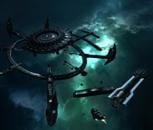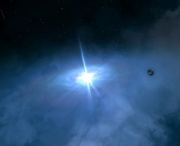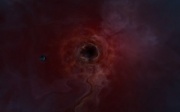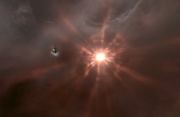
|
| Wormholes |
|---|
| Life in wormholes |
| EVE University specific |
| Reference |
| NPCs |
| External links |
Wormhole Space, also known as the Anoikis Galaxy, is a collection of semi-charted systems full of opportunity and danger. The discovery of Sleepers, an ancient Artificial Intelligence that dwells within Wormhole Space, led to groundbreaking new technology which in turn enabled the creation of Strategic Cruisers. Wormhole Space (W-Space) is lawless and has no CONCORD presence, Empire oversight or Sovereign Alliances.
Wormhole Space Characteristics
Wormhole Space has roughly 2600 known systems, each classified as one of six levels. These are commonly referred to as C1, C2, C3, C4, C5 or C6. They represent how entrenched the Sleeper occupation is and how strong the system effects (see below) can be. Additionally, 100 of those systems are classified as Shattered Wormhole Space, i.e. they contain only shattered planets and no moons.
Wormhole Space has no Stargates or Stations. Prior to the release of Citadel, anybody choosing to live in W-Space had to do so out of a Player Owned Starbase and accept that Wormholes will be their sole means of interstellar transport. The new player-owned Citadels are replacing the functionality of the old POS system, and have given corporations a new avenue to make and defend their homes. Thera is a unique wormhole system that has 4 Sisters of Eve stations and a number of special properties.
Visually W-Space is surrounded with cloud-like nebulae, partially blocking vision into the reaches of space. It is believed that Anoikis resides in a dense Nebula, which in turn provides necessary physical criteria for the abundant resources which are considered rare or non-existent in New Eden.
Local chat in W-Space is different from K-Space. You or any other players will only show up in channel if you're actually chatting. Otherwise they simply won't show up. You will continue to show up in local chat after you've typed, until all other players witnessing your presence have jumped system or logged off. Therefore to see who's in system you need to use scouts and D-Scan. Even then a cloaky ship won't be noticeable until it decloaks or logs off.
Exploration Sites and Cosmic Anomalies
Exploration sites in W-Space are different from K-Space. They are inhabited by Sleepers, which provide the materials to build Tech 3 Ships (Strategic Cruiser). Bringing a Dreadnought or Carrier into Anomalies, Data or Relic sites will spawn additional battleships in Class 5 and 6 W-Space systems. These spawns called Capital Escalations drop decent amounts of loot, allowing you to make ISK without completely finishing the site. Only two Capital Escalations can be triggered per capital type, totalling at four. All sites despawn three downtimes after they've been activated (initiated warp to). If a site isn't completed it will despawn on the fourth downtime after its activation. Escalation waves will regenerate after every downtime so it's possible to keep on farming a site for days.
Ore sites are anomalies that contain asteroids which can be mined. In higher class Wormholes the sites can contain enough ore to keep a dozen Hulks busy for days. An ore site can contain every known ore and is lightly guarded.
W-Space classes C1-3 also contains the same Data and Relic sites that spawn in Nullsec. These do not have any rats, Sleeper or otherwise. However unlike standard W-Space exploration sites, the hackable containers explode if your hacking attempt fails too many times.
Cosmic Signatures
Cosmic Signatures need to be probed down. They come in 5 types:
- Gas - These Sites will contain gas clouds, which can be harvested through a Gas Harvester. The gas is needed for Tech 3 production and is lightly guarded. See Wormhole Gas Sites for more details on this.
- Data - Data Sites will contain locked containers, containing items like datacores, which can be unlocked through Hacking. Sometimes there will be a Talocan ship wreck, which can be salvaged and will drop ancient hull sections for Tech 3 Ships. The sites are heavily guarded and can be escalated by capitals, unlike their K-Space counterparts.
- Relic - Those sites will contain ancient relics in containers, which have to be opened through Archaeology. Ancient relics are needed to generate T3 blueprints through reverse engineering. Relic Sites are heavily guarded and can be escalated by capitals unlike their K-Space counterparts.
- Wormhole - Not guarded by Sleepers, though it may be guarded by players. Unknown sites always indicate a Wormhole location, said wormhole will not spawn in its destination system until a player jumps through it. While it is by no means a guarantee, avoiding jumping wormhole signatures significantly reduces the chance that you will find yourself sharing the system with other players. It is worth noting that if a wormhole is opened towards you (your side is K162) the connection has been certainly established on both sides.
Other Activities
Production
W-Space has a structural advantage only in one area of production. This is unsurprisingly Tech 3 production. All the materials required for Strategic Cruiser (T3) hulls and subsystems originate from W-Space, giving W-Space a slight logistical advantage. It is also impossible to run a full T3 production line in systems with security status more than 0.3, further increasing this advantage.
For more information about Tech 3 Cruiser Production, you may start with the Tech 3 Manufacturing 101 syllabus.
In addition to T3 production, processes that aren't allowed in highsec space can be found in W-Space POSes. The most notable is Drug Manufacturing, utilizing the often short travel times to trade hubs -assuming you aren't unlucky- to import the necessary materials and exporting or locally selling the manufactured end-goods.
Anoikis Systems
Statics
Statics are a system variable. Each system will have a static (two for C2s), which will always have the same wormhole ID and lead you to the same class of W-Space or K-Space system as the previous one. When a static wormhole collapses a new static wormhole will spawn immediately, taking you to the same class of W-Space or K-Space.
Class 1 Systems
C1 systems are not very popular for harvesting or site running purposes. They are excellent for beginners. They're relatively safe, easy to run and require a low amount of skillpoints. A battlecruiser can solo the sites and a small cruiser gang will easily run the sites efficiently.
C1 systems have a niche role of being used by small Tech 3 Manufacturing Corporations. Some of these corporations will build one or two carriers which will make them very hard to evict due to POS reinforcement mechanics.
Class 1 Systems |
|
||||||||||||
| Possible Statics | Anomalies | Ore Sites | Gas Sites | Relic Sites | Data Sites | ||||||||
|---|---|---|---|---|---|---|---|---|---|---|---|---|---|
| Nullsec (Z060) Lowsec (J244) Hisec (N110) |
Perimeter Ambush Point Perimeter Camp Phase Catalyst Node The Line |
Average F.D. Unexceptional F.D. Uncommon C.D. Ordinary P.D. Common P.D. Exceptional C.D. Infrequent C.D. Unusual C.D. Rarified C.D. Isolated C.D. |
Barren P.R. Minor P.R. Ordinary P.R Sizeable P.R. Token P.R. Bountiful F.R. Vast F.R. Instrumental C.R. Vital C.R. |
Forgotten Perimeter Coronation Platform Forgotten Perimeter Power Array |
Unsecured Perimeter Amplifier Unsecured Perimeter Information Center |
||||||||
Class 2 Systems
C2 wormhole systems have a special role in low-class Wormhole Space systems. They offer slightly more ISK than C1's and can be soloed by low skillpoint Battlecruiser pilots. Their special property is that they come with two statics. These statics provide guaranteed access to K-Space and W-Space.
Class 2 Systems |
|
||||||||||||
| Possible Statics | Anomalies | Ore Sites | Gas Sites | Relic Sites | Data Sites | ||||||||
|---|---|---|---|---|---|---|---|---|---|---|---|---|---|
| Hisec (B274) & C1 (Z647) Hisec (B274) & C3 (O477) Hisec (B274) & C4 (Y683) Lowsec (A239) & C2 (D382) Nullsec (E545) & C5 (N062) Nullsec (E545) & C6 (R474) |
Perimeter Checkpoint Perimeter Hangar The Ruins of Enclave Cohort 27 Sleeper Data Sanctuary |
Average F.D. Unexceptional F.D. Uncommon C.D. Ordinary P.D. Common P.D. Exceptional C.D. Infrequent C.D. Unusual C.D. Rarified C.D. Isolated C.D. |
Barren P.R. Minor P.R. Ordinary P.R Sizeable P.R. Token P.R. Bountiful F.R. Vast F.R. Instrumental C.R. Vital C.R. |
Forgotten Perimeter Gateway Forgotten Perimeter Habitation Coils |
Unsecured Perimeter Comms Relay Unsecured Perimeter Transponder Farm |
||||||||
Class 3 Systems
C3 Systems are excellent for beginner wormhole corporations. They come with a K-Space statics of any kind, allowing you to pick your environment. C3's also offer good ISK for their difficulty, a battlecruiser gang with local rep or a little Tech 1 logi support will burn through the sites.
Class 3 Systems |
|
||||||||||||
| Possible Statics | Anomalies | Ore Sites | Gas Sites | Relic Sites | Data Sites | ||||||||
|---|---|---|---|---|---|---|---|---|---|---|---|---|---|
| Hisec (D845) Lowsec (U210) Nullsec (K346) |
Fortification Frontier Stronghold Outpost Frontier Stronghold Solar Cell The Oruze Construct |
Average F.D. Unexceptional F.D. Uncommon C.D. Ordinary P.D. Common P.D. Exceptional C.D. Infrequent C.D. Unusual C.D. Rarified C.D. Isolated C.D. |
Barren P.R. Minor P.R. Ordinary P.R Sizeable P.R. Token P.R. Bountiful F.R. Vast F.R. Instrumental C.R. Vital C.R. |
Forgotten Frontier Quarantine Outpost Forgotten Frontier Recursive Depot |
Unsecured Frontier Database Unsecured Frontier Receiver |
||||||||
Class 4 Systems
Prior to the Hyperion expansion, C4 Systems were not very loved. C4 combat sites provide a little more ISK than C3 but require quite a bit more effort. C4s, like C5s and C6s, don't have statics to K-Space. However, unlike any other class, they never have any incoming wormholes from K-space either. This means at least a two-jump chain to reach K-Space. It is worth noting however, that C4 residents like the space they live in mainly because C4s are lower maintenance both on the capital and active player front. C4s also grant access to frequent PvP.
Since the Hyperion expansion in 2014, all C4 Systems have two static wormholes. Each wormhole leads to another system in W-space. The wormholes are always different types (so you can't have a C4 system with two C3 statics, for example). The possible combinations of statics is not yet well researched, but initial findings seem to indicate that most combinations can be found (with the possible exception of C1/C6 and C2/C6 pairs).
Class 4 Systems |
|
||||||||||||
| Possible Statics | Anomalies | Ore Sites | Gas Sites | Relic Sites | Data Sites | ||||||||
|---|---|---|---|---|---|---|---|---|---|---|---|---|---|
| C1 (P060) C2 (N766) C3 (C247) C4 (X877) C5 (H900) C6 (U574) |
Frontier Barracks Frontier Command Post Integrated Terminus Sleeper Information Sanctum |
Average F.D. Unexceptional F.D. Uncommon C.D. Ordinary P.D. Common P.D. Exceptional C.D. Infrequent C.D. Unusual C.D. Rarified C.D. Isolated C.D. |
Barren P.R. Minor P.R. Ordinary P.R Sizeable P.R. Token P.R. Bountiful F.R. Vast F.R. Instrumental C.R. Vital C.R. |
Forgotten Frontier Conversion Module Forgotten Frontier Evacuation Center |
Unsecured Frontier Digital Nexus Unsecured Frontier Trinary Hub |
||||||||
Class 5 Systems
C5 systems are the premium choice for most hardcore wormhole corporations : C5's are highly connectible to other C5's, giving the nickname "The C5 Highway" to such connections and chains.
Class 5 Systems |
|
||||||||||||
| Possible Statics | Anomalies | Ore Sites | Gas Sites | Relic Sites | Data Sites | ||||||||
|---|---|---|---|---|---|---|---|---|---|---|---|---|---|
| C1 (Y790) C2 (D394) C3 (M267) C4 (E175) C5 (H296) C6 (V753) |
Core Garrison Core Stronghold Oruze Osobnyk Quarantine Area |
Average F.D. Unexceptional F.D. Uncommon C.D. Ordinary P.D. Common P.D. Exceptional C.D. Infrequent C.D. Unusual C.D. Rarified C.D. Isolated C.D. |
Barren P.R. Minor P.R. Ordinary P.R Sizeable P.R. Token P.R. Bountiful F.R. Vast F.R. Instrumental C.R. Vital C.R. |
Forgotten Core Data Field Forgotten Core Information Pen |
Unsecured Frontier Enclave Relay Unsecured Frontier Server Bank |
||||||||
Class 6 Systems
The hardest system to tame of them all, C6 wormholes represent the pinnacle of wormhole life. In truth, there is much debate between C5 and C6 residents on the merits and drawbacks of C6 wormholes. The sites have Capital Escalations like C5 sites and they spawn more frequently.
Class 6 Systems |
|
||||||||||||
| Possible Statics | Anomalies | Ore Sites | Gas Sites | Relic Sites | Data Sites | ||||||||
|---|---|---|---|---|---|---|---|---|---|---|---|---|---|
| C1 (Q317) C2 (G024) C3 (L477) C4 (Z457) C5 (V911) C6 (W237) |
Core Citadel Core Bastion Strange Energy Readings The Mirror |
Average F.D. Unexceptional F.D. Uncommon C.D. Ordinary P.D. Common P.D. Exceptional C.D. Infrequent C.D. Unusual C.D. Rarified C.D. Isolated C.D. |
Barren P.R. Minor P.R. Ordinary P.R Sizeable P.R. Token P.R. Bountiful F.R. Vast F.R. Instrumental C.R. Vital C.R. |
Forgotten Core Assembly Hall Forgotten Core Circuitry Disassembler |
Unsecured Core Backup Array Unsecured Core Emergence |
||||||||
System Effects
Certain W-Space systems have effects that change the nature of your ship's statistics and/or modules. These phenomena only affect capsuleer ships, so Sleepers or structures won't be affected. The only in-game ways of telling what type of system you're in are the visual markers on the horizon or checking your fitting window for statistics changes, such as Armor HP in a Wolf-Rayet. Generally players use third-party websites to check systems for effects.
On August 26th, 2014, with the Hyperion update, System Effects were rebalanced. All tables are updated with these new balance numbers. Dev Blog
Pulsar
Pulsar systems are very powerful when utilized correctly. They provide bonuses to shield amount and capacitor recharge time, effectively doubling both stats' effectiveness in C6s. Armor ships will suffer a resistance debuff, and should be used carefully or not at all. NOSes and Neuts are also strengthened to help counter capital ship's massive tanks in these W-Space systems.
Black Hole
If you love speed, you'll love Black Hole systems. The velocity bonus here allows the possibility of reaching amazing speeds, though increased Inertia and a Stasis Web penalty will make it hard to stop! Missile and Targeting bonuses make kiting missile platforms paramount in these now potentially habitable systems.
Cataclysmic Variable
Cataclysmic Variable systems basically increase the logistics capabilities of your fleet. Self-repping won't be as viable, which might be a problem for triaging Carriers or sieging Dreadnoughts. These systems also have a bonus to capacitor amount and a lesser debuff to capacitor recharge, overall giving you more stability. The Capacitor Transfer penalty discourages spider-tanking, especially in carriers.
Magnetar
While Magnetars suffer from damage application reductions, they come with a massive straight-out damage bonus. Magnetars are generally liked. Running sites in them is faster.
Red Giant
Red Giants are very specialized. They're not sought after, not because they're bad but because they don't have much to offer. The bonus to smartbomb range and damage can be useful, especially when camping holes. The overheating bonus will allow your overheated modules to be even more effective, but they will burn out quicker. Also, the Bomb Damage bonus provides more potential for Stealth Bomber effectiveness - though do note, the bombs don't have extra HP.
Wolf Rayet
Wolf Rayets are partially opposite to Pulsars. The obvious differences are the bonus to Armor HP and the reduction to Shield Resists. There is also a bonus to signature radius which further enforces the armor doctrine fleets. The small gun damage bonus opens interesting possibilities for gangs consisting of smaller sized ships.
Misc
- Everybody loves Tech 3 Ships in W-Space because they provide the best efficiency/mass ratio which is important when jumping wormholes.
- An "eviction" is the act of an entity kicking another out of their home system. You might think of it as a SOV war, only in a single system instead of numerous regions.
- Supercapitals don't fit through wormholes. Don't try it.
- EVE University has its own Wormhole Campus!






